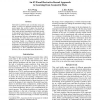Free Online Productivity Tools
i2Speak
i2Symbol
i2OCR
iTex2Img
iWeb2Print
iWeb2Shot
i2Type
iPdf2Split
iPdf2Merge
i2Bopomofo
i2Arabic
i2Style
i2Image
i2PDF
iLatex2Rtf
Sci2ools
AAAI
2015
2015
An SVD and Derivative Kernel Approach to Learning from Geometric Data
Motivated by problems such as molecular energy prediction, we derive an (improper) kernel between geometric inputs, that is able to capture the relevant rotational and translation invariances in geometric data. Since many physical simulations based upon geometric data produce derivatives of the output quantity with respect to the input positions, we derive an approach that incorporates derivative information into our kernel learning. We further show how to exploit the low rank structure of the resulting kernel matrices to speed up learning. Finally, we evaluated the method in the context of molecular energy prediction, showing good performance for modeling previously unseen molecular configurations. Integrating the approach into a Bayesian optimization, we show substantial improvement over the state of the art in molecular energy optimization.
Related Content
| Added | 27 Mar 2016 |
| Updated | 27 Mar 2016 |
| Type | Journal |
| Year | 2015 |
| Where | AAAI |
| Authors | Eric Wong, J. Zico Kolter |
Comments (0)

